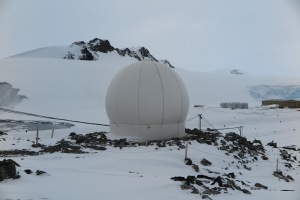Internet bandwidth at Antarctic latitudes is very expensive. Obviously there aren’t any broadband fibre cables so satellite internet is the only option. And there are only a limited number of satellites that attempt to provide coverage this far south.
Rothera station has a 2.4m VSAT dish stored inside a radome sitting on the point just behind the base. The dish talks to the NSS-7 satellite which is a geostationary communications satellite, located in the sky at 0°0′N 20°00′W. To point the dish antennae at the equator the dish points at a dis-concertedly shallow angle. So low, that if work is required on the roof of one of the station buildings the dish must stop transmitting.

This shallow angle also means that the signal has to penetrate a lot of weather as it glances through the atmosphere for a significant distance. This means that snow and precipitation thousands of miles away from the base can significantly impacts on the service. And it frequently does.
The station telephony system is a Cisco VOIP system that uses the internet connection to carry the incoming and outgoing telephone messages.
So outages cause a disruption to both the internet and telephone system.
Because field parties may try to telephone the station at any time of the night the status of the link is monitored 24/7 by the night watch person. If the link fails in the middle of the night the night watch person will wake up the communications manager.

The modem and codan equipment to modulate the satellite signal sits in a cabinet in the boot room of the Giants accommodation building. These manage the traffic and the antennae.
